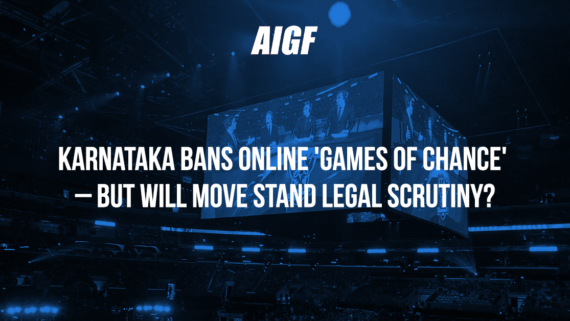To ban or not to ban: The question around fantasy gaming platforms
December 2020 saw the Indian states of Tamil Nadu & Andhra Pradesh imposing a ban on online fantasy gaming, particularly those comprising gambling & wagering. These consists of games which comprise real money like fantasy sports betting or online card games. The Andhra Pradesh Legislative Assembly passed the AP Gaming (Amendment) Bill 2020 by voice vote on December 1 whereas Tamil Nadu passed an ordinance promulgated by Governor Banwarilal Purohit that banned wagering or betting in cyberspace via computers or any communication device.
Both Tamil Nadu & Andhra Pradesh mentioned the reason that online gambling leads to youngsters being duped & results in them falling into debt. The ban also was the culmination of some youngsters committing suicide over the last few months. After these two states, now Karnataka is also in the process of banning online gambling.
Even though there are worries regarding the effect of such games on youngsters, there exists an argument about it being gambling versus a game of skill. The apparent solution involves regulating a hugely unregulated sector through an appropriate framework.
How Are The Bans In Those Two States Being Put Into Action?
Speaking of Tamil Nadu, anyone found playing online gambling games will be charged a fine of Rs 5,000 & get six months imprisonment as a punishment. Moreover, Tamil Nadu has also imposed a ban on electronic transfer of funds for wagering or betting & disbursing winnings & prize money. Additionally, there are also provisions in the law to punish those found running online gaming companies which comprise wagering & betting.
In the case of Andhra Pradesh, the 1st offence by an individual will lead to imprisonment of up to 1 year & a fine of Rs 5,000, with every consequent offence attracting imprisonment extending up to two years & fine up to Rs 10,000.
Adhering to the bans, gaming app companies have made their games non-accessible in these 2 states for tournaments comprising real money.
Co-founder & CEO of Mobile Premier League (MPL) Sai Srinivas said, “We have in-built geo-blocking to ensure that users from the states in question are unable to access cash or real money tournament formats for any of the games they offer.”
CEO of RummyBaazi.com Sunit Warriach said, “We have been prompt in banning all the accounts and refunding the amount in users’ wallets from those states. Furthermore, we shut down all the marketing activities in those states and do not entertain any new registrations on the app.”
Nonetheless, free versions of the games which do not comprise real money transactions can still be accessed by users of these two states.
An Industry With A Bright Future
These bans by some Indian states on online gaming have transpired during the golden age of the industry, wherein it has been experiencing massive growth fuelled by the rising accessibility of cheap smartphones and internet throughout the country. To be specific, the Indian online gaming industry witnessed a growth of 40% in the year 2019, as per a report by the Federation of Indian Chambers of Commerce & Industry and Ernst & Young. This report which was released in March 2020 envisaged the sector to rise to a valuation of Rs 18,700 crore by 2022. The report preceded the Covid-19 pandemic which significantly boosted the growth of the online gaming industry & this was moreover evident in the number of online gaming startups which managed to raise funds in the last quarter of 2020.
Online fantasy gaming platforms are currently governed by the Public Gambling Act of India, 1867, as per which any type of gambling is illegal. Nonetheless, online fantasy gaming platforms put forth the fact that games like rummy & poker are games of skill & don’t come under the ambit of gambling. Importantly, these platforms have received a positive response via the verdict of some Indian High Courts which have attested to the fact that these games are indeed games of skill and do not amount to gambling. The effect of this was evident in the Tamil Nadu Gaming Act which exempts ‘games of mere skill’. Nevertheless, Telangana (which imposed a ban on online gaming in 2017) & Andhra Pradesh have levied a blanket ban on online games.
As per Surbhi Kejriwal, Rishabh Bharadwaj & Abhishek Rao of law firm Khaitan & Co, even though the Tamil Nadu ordinance attempts to prohibit online real money games like rummy & poker, the prohibition is not applicable to games of mere skill. Nonetheless, online rummy & poker are permitted under the current legal framework. The Supreme Court of India has held that rummy is a game of skill. Likewise, poker is allowed in West Bengal, Sikkim, Nagaland, Goa and Daman & Diu (by legislation) and Karnataka (by judicial precedent).
According to experts, this has increased confusion in an industry which is already surrounded by legal multiplicity & uncertainties. It’s important to note that Google Play Store moreover doesn’t permit apps which promote or are involved in gambling or betting comprising real money.
“We hope that this confusion will be cleared by the Tamil Nadu Legislative Assembly once it’s in session and that online games involving skill will be permitted. The Assembly is required to approve the Ordinance, with or without changes, within six weeks of reassembling pursuant to Article 213 of the Constitution of India, failing which the Ordinance will cease to be in force,” the authors stated in an analysis on the Tamil Nadu ban.
With online fantasy sports like fantasy cricket or football also comprising real money, gaming companies are additionally facing the negative effects of these bans.
“We wish to make it clear that as per Indian laws, fantasy sports are completely legal and allowed all over India, except in a few states… They are a game of skill, just like chess and quiz,” Paytm First Games said in an interaction.
The industry has been demanding regulation of the sector with an appropriate framework rather than the imposition of a ban. Presently, there exist various industry bodies like the Federation of Indian Fantasy Sports (FIFS), All India Gaming Federation (AIGF), The Online Rummy Federation (TORF), and more, who make sure that there is some kind of self-regulation in the online gaming industry & work towards safeguarding the interests of the industry by making representations to the government.
“The industry has been having dialogues with both state and central governments consistently along with the federations. We have presented a detailed report of how all the members are self-regulated and follow the charters laid out by relevant authorities/bodies like AIGF, FIFS, TORF, etc., that have been drafted by ex-Chief Justices and senior government officials. We’re hopeful that the government will consider our representations and regulate the sector with a proper framework instead of implementing bans,” Sunit says.
Even though the debate on gambling versus game of mere skill has been prevalent for a long time, Sunit states that the current need is to differentiate between Indian companies & offshore companies which run illegally, & actions to be taken depending on that.
A Glimmer Of Hope
NITI Aayog recently published a draft guidelines proposal for the online fantasy gaming sector, while identifying the potential of the industry. It stated that the sector witnessed growth at a CAGR of 212% from 2 million users in 2016 to 90 million in December 2019, with the potential to lure Foreign Direct Investment (FDI) of over Rs 10,000 crore in the period of the upcoming few years & generate 1.5 billion online transactions by the year 2023.
While stating that the sector has the potential to create employment in the country, the proposal looks to set up an independent oversight body (a self-regulating body) which will be in charge of operational issues of the platforms & companies in the industry. With few states banning online gaming apps & other states permitting them, the proposal by the NITI Aayog looks to bring uniformity in regulations.
The proposal has been greeted positively & widely welcomed by the industry, particularly due to the fact that it validates the industry’s potential.
“With progressive, light-touch regulations in place, India will be well-placed to become a global leader in e-sports, a sector that is likely to create millions of job opportunities. We strongly believe that the self-regulatory body proposed by NITI Aayog should be set up on the principles of fairness, transparency and independence, so it can help spur further innovation and ensure a level-playing field for all platforms,” MPL’s Sai Srinivas said.
At the same time, Sunit states that a centrally regulated system is in the best interests of the industry which is experiencing growth at a swift pace. He further states that the steps proposed by NITI Aayog to formulate & centralise the online gaming fraternity shall play the purpose of the foundation to an increasingly stabilised, controlled & systematic niche.
“It promotes the ideology of skill-based gaming, which is what fantasy sports is at its core, and favours the overall growth of the sector. We also want to urge them to have a broader perspective and consider other games of skill such as poker and rummy that are growing rapidly in India,” he adds.











Comments
Comments are closed.